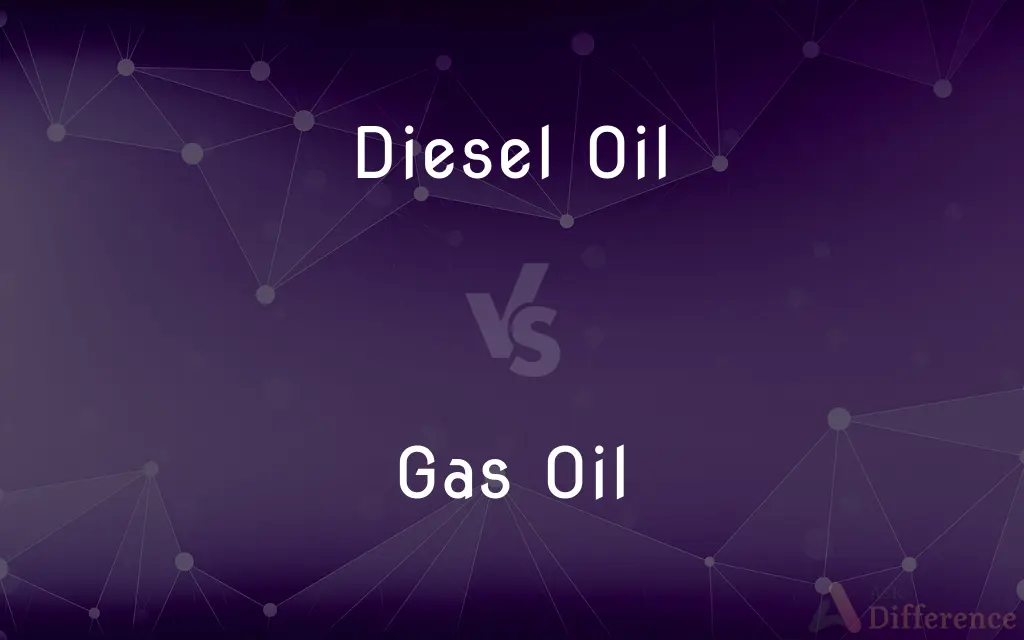Diesel Oil vs. Gas Oil — What's the Difference?
Edited by Tayyaba Rehman — By Fiza Rafique — Published on October 30, 2024
Diesel oil is a fuel used primarily in diesel engines, known for its high energy efficiency, while gas oil, often referred to as heating oil or red diesel, is used in heating applications and off-road vehicles, marked by its lower tax status.

Difference Between Diesel Oil and Gas Oil
Table of Contents
ADVERTISEMENT
Key Differences
Diesel oil is refined specifically for use in diesel engines, which require a fuel that ignites under high pressure without a spark. Gas oil, on the other hand, serves a broader purpose, including as a heating fuel and in older diesel engines, especially in agricultural and construction equipment.
The chemical composition of diesel oil is tailored to provide high energy content and efficient combustion, making it suitable for vehicles and machinery demanding high performance. Gas oil, while similar in composition, may contain additives or have a different sulfur content to suit its specific use in heating or as a less regulated fuel for off-road vehicles and machinery.
In terms of taxation and environmental regulations, diesel oil used in road vehicles is subject to stricter controls and higher taxes due to its impact on air quality and emissions. Gas oil, often dyed to distinguish it from road diesel, benefits from lower taxes but is restricted to non-road applications to prevent misuse.
Diesel oil's efficiency and power output make it a preferred choice for transportation and industrial applications, where fuel performance directly influences operational costs and productivity. Gas oil's versatility and cost-effectiveness, however, make it an essential fuel for heating, agriculture, and construction sectors, where strict emission standards are less critical.
The choice between diesel oil and gas oil often comes down to the specific requirements of the equipment or application, including performance needs, regulatory compliance, and cost considerations. Both fuels play crucial roles in their respective domains, powering a wide range of engines and heating systems.
ADVERTISEMENT
Comparison Chart
Primary Use
Diesel engines (vehicles, machinery)
Heating, agriculture, off-road machinery
Ignition Method
Compression ignition
Compression ignition (but optimized for different engines)
Composition
High energy content, low sulfur
May contain additives, variable sulfur content
Taxation and Regulation
Higher taxes, strict emissions regulations
Lower taxes, marked with dye for restricted use
Applications
Transportation, industrial machinery
Heating, agricultural and construction equipment
Compare with Definitions
Diesel Oil
Diesel oil's formulation reduces wear and prolongs engine life.
Diesel lubricants in the oil protect engine components during operation.
Gas Oil
It's also known as red diesel due to the dye added for identification.
Red diesel powers construction equipment without on-road taxes.
Diesel Oil
Diesel oil is a fuel optimized for use in diesel engines, offering high efficiency.
Modern trucks use diesel oil for long-haul transportation.
Gas Oil
This fuel benefits from lower taxation for non-road use.
Heating systems in remote areas frequently use gas oil as a cost-effective fuel.
Diesel Oil
It ignites under high pressure, making it suitable for engines without spark plugs.
Diesel generators provide electricity with diesel oil as fuel.
Gas Oil
Gas oil meets the needs of older diesel engines and heating systems.
Vintage diesel locomotives are occasionally powered by gas oil.
Diesel Oil
Diesel oil is subject to environmental regulations due to its emissions.
Diesel cars undergo emissions testing to comply with air quality standards.
Gas Oil
Gas oil is used primarily for heating and in off-road diesel engines.
Farm tractors often run on gas oil for field operations.
Diesel Oil
The fuel is designed to maximize power output and fuel economy.
Diesel engines in heavy machinery use diesel oil for optimal performance.
Gas Oil
Gas oil can have additives to improve performance in specific applications.
Winterized gas oil prevents freezing in outdoor heating tanks.
Common Curiosities
Are diesel oil and gas oil the same in terms of efficiency?
Diesel oil is refined for high efficiency in vehicle engines, whereas gas oil's efficiency varies based on its specific application.
What's the main difference between diesel oil and gas oil?
Diesel oil is primarily for diesel engines in vehicles and machinery, while gas oil is used for heating and off-road engines.
How do environmental regulations affect diesel oil and gas oil?
Diesel oil for road use faces stricter regulations to minimize emissions, while gas oil used in heating and agriculture is subject to less stringent controls.
Can diesel oil and gas oil be used interchangeably?
While technically similar, their use is dictated by regulation, engine requirements, and the presence of additives, making interchangeability limited and often illegal.
Why is gas oil dyed red?
The dye marks it for specific uses (like heating or agriculture) to prevent misuse in road vehicles, aiding tax enforcement.
Can I use gas oil in my diesel car?
Using gas oil in a diesel car is illegal in many jurisdictions due to tax evasion and potential engine damage.
Are there any health risks associated with using diesel oil or gas oil?
Both fuels emit pollutants that can pose health risks, hence the importance of using them within regulated guidelines and with proper ventilation.
What makes diesel oil suitable for modern engines?
Its high energy content and additives designed to reduce emissions and improve engine life make it suitable.
Do diesel oil and gas oil have the same sulfur content?
No, diesel oil typically has lower sulfur content to meet road vehicle emissions standards, while gas oil's sulfur content can vary.
Can gas oil damage a diesel engine designed for road use?
Yes, because it may not meet the cleaner fuel requirements of modern diesel engines, leading to potential damage or reduced performance.
Why is gas oil preferred for heating?
Its cost-effectiveness and formulation suitable for heating applications make it a preferred choice.
How has the use of diesel oil and gas oil changed over time?
Technological advances and stricter environmental regulations have led to cleaner formulations of both fuels, although their primary applications have remained relatively consistent.
What are the consequences of using diesel oil in applications meant for gas oil?
Using diesel oil in place of gas oil can be unnecessarily expensive and may not meet the specific requirements or regulations for the intended use.
Is it cheaper to use gas oil for heating than diesel oil?
Yes, due to lower taxes and regulations, gas oil is usually cheaper for heating purposes.
How do I know if my fuel is diesel oil or gas oil?
The presence of a red dye typically indicates gas oil, intended for specific uses outside of on-road vehicles.
Share Your Discovery

Previous Comparison
Cake Flour vs. Self-Raising Flour
Next Comparison
Exergonic Reaction vs. Endergonic ReactionAuthor Spotlight
Written by
Fiza RafiqueFiza Rafique is a skilled content writer at AskDifference.com, where she meticulously refines and enhances written pieces. Drawing from her vast editorial expertise, Fiza ensures clarity, accuracy, and precision in every article. Passionate about language, she continually seeks to elevate the quality of content for readers worldwide.
Edited by
Tayyaba RehmanTayyaba Rehman is a distinguished writer, currently serving as a primary contributor to askdifference.com. As a researcher in semantics and etymology, Tayyaba's passion for the complexity of languages and their distinctions has found a perfect home on the platform. Tayyaba delves into the intricacies of language, distinguishing between commonly confused words and phrases, thereby providing clarity for readers worldwide.













































